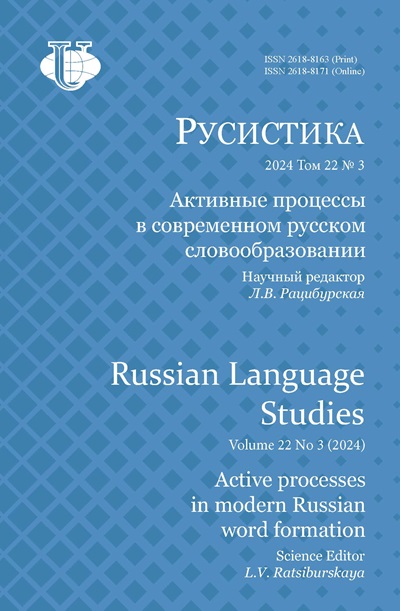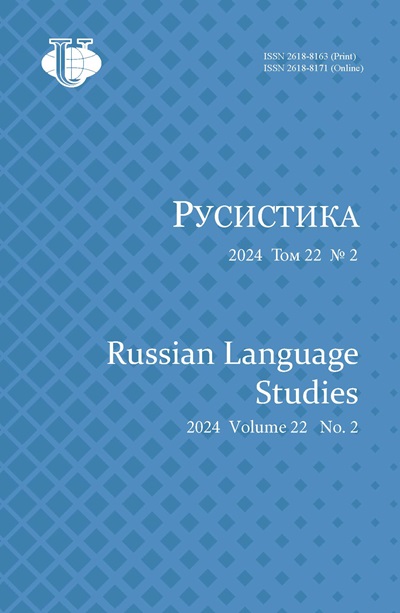Russian terminology of the digital society: grammatical features in the focus of neology and neography
- Authors: Marinova E.V.1
-
Affiliations:
- Linguistics University of Nizhny Novgorod
- Issue: Vol 22, No 2 (2024)
- Pages: 225-241
- Section: Actual Problems of Russian Language Studies
- URL: https://journals.rudn.ru/russian-language-studies/article/view/40558
- DOI: https://doi.org/10.22363/2618-8163-2024-22-2-225-241
- EDN: https://elibrary.ru/SESKAP
Cite item
Full Text
Abstract
The relevance of the research is in the need of observation and analysis of new phenomena in the Russian language, as well as the representation of grammatical information in terminological dictionary that contains nominations of the new subject area. The aim of the study is to identify the grammatical features of the Digital Society terminology in the Russian language of the XXI century. The research material consists of over 500 terms identified with a continuous sampling from official documents and news on the website of the Ministry of Digitalization of the Russian Federation and from media and scientific texts. The research method of empirical material is based on the traditional comprehensive analysis of a new linguistic unit: semantic, morphological, syntactic, word-formation. To confirm the variation of some terms, the author conducted a poll, and a survey of social networks and other new media with the help of parsing. Summarizing the results, the author follows the idea of linguocognitive correlation of linguistic phenomena and changes. The study revealed the terms used mostly in the plural form, so this form became the initial one; new cases and types of grammatical variation of terms in relation to the category of animate/inanimate ( otklyuchit' golosovogo pomoshchnika/golosovoi pomoshchnik ) are described; the causes and types of formal variation of compound terms ( neironnaya set’ - neiroset’ ) are described. The results of the research prove that it is advisable to reflect the grammatical features of a term in lexicographic description of forming terminology at its early stage. The prospects of the study are seen in research of the Digital Society terminology from the point of view of wordformation features and their connection with the grammatical and semantic characteristics of terms, as well as in studying the influence of the “graphics factor” (writing the term in Latin) on the grammatical “behavior” of the term.
About the authors
Elena V. Marinova
Linguistics University of Nizhny Novgorod
Author for correspondence.
Email: marinova@list.ru
ORCID iD: 0000-0003-3860-5606
SPIN-code: 9498-9911
Doctor of Philology, Professor of the Department of Teaching Russian as a Native and Foreign Language
31a Minina St , Nizhny Novgorod, 603155, Russian FederationReferences
- Altoukhov, A.V., & Afinskaya, Z.N. (2021). On plasticity of the term ecosystem. Voprosy Kognitivnoy Lingvistiki, (3), 109–116. (In Russ.). https://doi.org/10.20916/1812-3228-2021-3-109-116
- Bozhenkova, N.A., Rubleva, E.V., & Baharloo, H. (2023). Dictionary of IT terms as a tool for Russian language studies and linguodidactics in the context of digitalization in education. Russian Language Studies, 21(4), 457–473. (In Russ.). https://doi.org/10.22363/2618-8163-2023-21-4-457-473
- Chel’tsova, L.K. (1981). Lexicographic variants of the number form. Literaturnaya norma i variantnost’. Moscow: Nauka Publ. (In Russ.).
- Glushchenko, O.A. (2022). Representation of social protest in an expressive nomination (using the example of the names of the COVID-19 vaccination certificate and QR code). Kazan Science, (1), 34–36. (In Russ.).
- Hassan, R. (2020). Digitality, virtual reality and the “empathy machine”. Digital Journalism, 8(2), 195–212. https://doi.org/10.1080/21670811.2018.1517604
- Kapanadze, L.A. (2005). Functioning of science and technology terms in the general literary language of the ХХ century. Voices and Meanings. Selected works on Russian language (pp. 40–80). Moscow: Institute of Russian Language RAS Publ. (In Russ.).
- Klementieva, A.A. (2022). On the issue of the term artificial intelligence functioningin modern scientific and social-political discours. World of the russian word, (4), 14–23. (In Russ.). https://doi.org/10.24412/1811-1629-2022-4-14-23
- Kutyrev, V.A. (2022). Chelo-vek of technology, the civilization of falsehood. Saint-Petersburg: Aleteiya Publ. (In Russ.).
- Leichik, V.M. (1982). Lexical variation and its resolution in the system, standard and speech (on the material of scientific-technical and socio-political terms). Variation as a property of the language system, (1), 146. Moscow: Nauka Publ. (In Russ.).
- Lupton, D. (2013). Introducing digital sociology. Sydney: University of Sydney Publ.
- Marinova, E.V. (2008). Foreign words in Russian speech of the late XX — early XXI century: the problem of assimilation and functioning. Moscow: ELPIS Publ. (In Russ.).
- Marinova, E.V. (2022). The opposition “man — machine” in the language picture of the world of the 21 century. Humanitarian vector, 17(2), 161–170. (In Russ.). https://doi.org/10.21209/1996-7853-2022-17-2-161-170
- Nemchenko, V.N. (1990). Variation of linguistic units. Typology of variants in the modern Russian language. Krasnoyarsk State University Publ. (In Russ.).
- Nemchenko, V.N. (1998). Grammatical variation of a word in the modern Russian language and literary standard. Nizhny Novgorod: Lobachevsky National Research State University Publ. (In Russ.).
- Plotnikova, A.M. (2023). Neyroset’ as a keyword of the current moment. Philological class, 28(2), 45–54. (In Russ.). https://orcid.org/0000-0002-6027-2855
- Selwyn, N. (2019). What is Digital Sociology? Cambridge, UK: Polity Press Publ.
- Vepreva, I.T., & Kupina, N.A. (2018). Bitcoin. Russian language abroad, (3), 122–125. (In Russ.).
- Volkov, V.V. (2020a). “Digital economy”: linguistic and linguomental aspects. Philology. Theory & Practice, 13(7), 135–139. (In Russ.). https://doi.org/10.30853/filnauki. 2020.7.24
- Volkov, V.V. (2020b). Artificial “intelligence” and the human mind: futuristic synecdoche and reality (linguistic and linguomental aspects). RUDN Journal of Language Studies, Semiotics and Semantics, 11(4), 745–759. (In Russ.). https://doi.org/10.22363/2313-2299-2020-11-4-745-759
- Volkov, V.V., & Volkova, N.V. (2020). “Digital civilization”: utopia, dystopia, or simulacrum? Humanitarian knowledge and spiritual security: Proceedings the VII International Conference (рр. 67–72). Grozny, Makhachkala: Chechen State Pedagogical University Publ., ALEF. (In Russ.).















